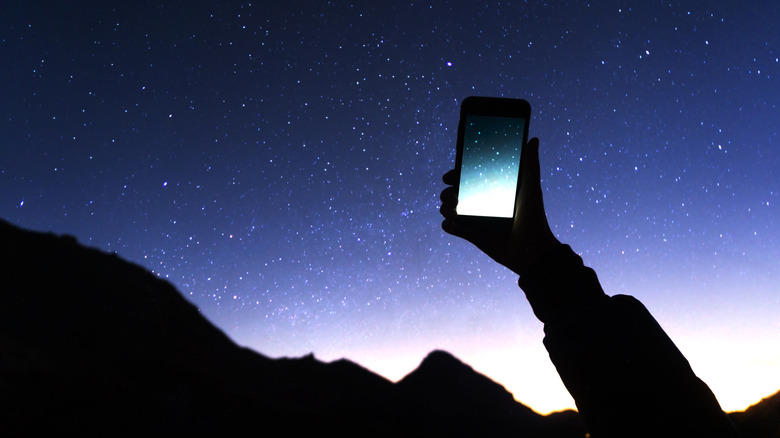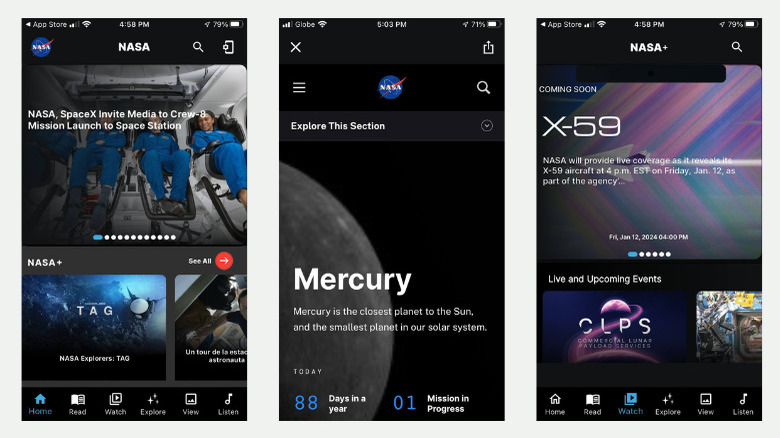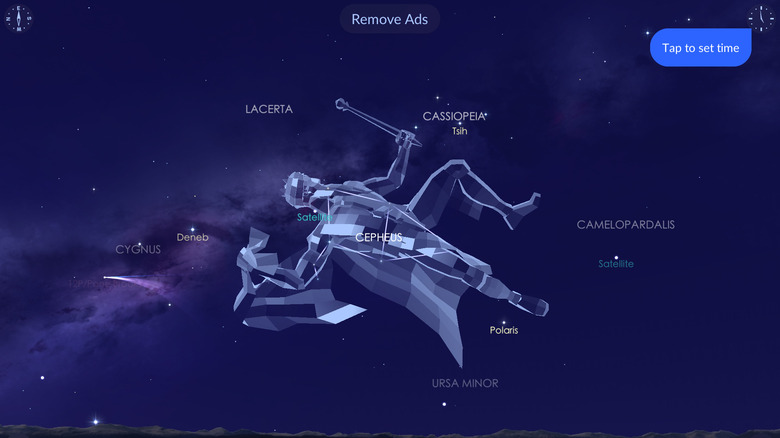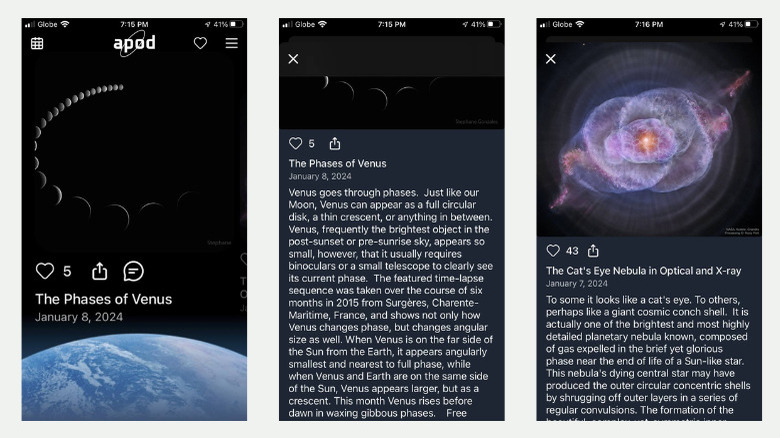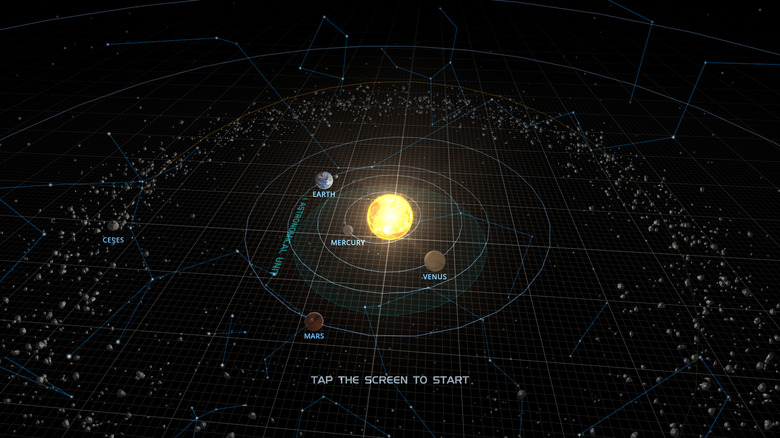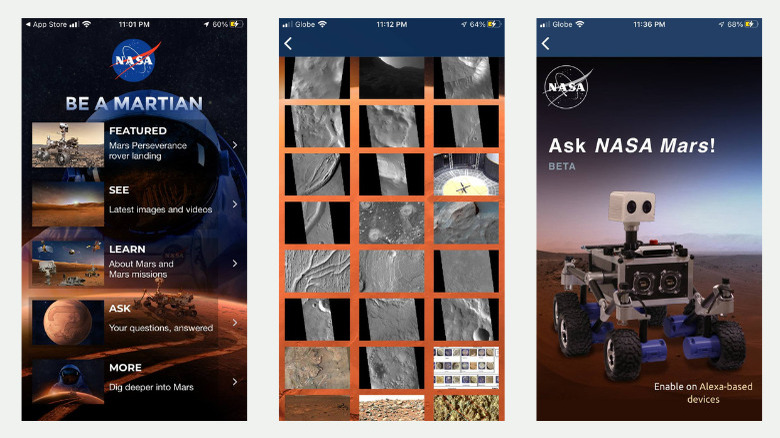5 Great Apps For People Who Love To Learn About Space
Who wouldn't be curious about what's out there beyond Earth's atmosphere? With interesting phenomena like dramatic star deaths and mysterious black hole formations, the cosmos is undeniably an endless source of fascination. Fortunately, in this day and age, learning about space is easier than ever. You no longer need to hoard an entire collection of bulky space encyclopedias or wait for your science teacher to get on with the astronomy lessons. With the colossal resources available online, information about your favorite galaxies and even the ISS's real-time location are just at your fingertips.
However, if you prefer getting your learning fix from the convenience of the dedicated app instead of just your browser, there are a couple of great apps you can look into. We've compiled five of them in this list to get you started, some of which are available on both the Google Play Store and Apple App Store, while others are exclusive for Android or iOS.
NASA
If you love to learn about space, then there's no better tool than the official NASA app itself. Available on both Android and iOS, this app is your gateway to a whole universe (pun intended) of information and resources. It features five sections tailored to different preferences:
- Read: This tab is packed with the latest news about NASA's missions, discoveries, and educational initiatives. You can read up on updates on the Artemis program, the ongoing adventures of Mars rovers, and past talks by NASA astronauts.
- Watch: If you're not into reading, you can watch instead. This tab comes complete with live news broadcasts, stories of the agency's iconic figures and programs, and stunning videos of the planets in the solar system, among other things.
- Explore: This section is a hub of knowledge about the solar system and NASA's exploratory programs. If you like reading overviews of the planets, NASA's satellites, and even the Commercial Crew Program, the Explore tab has you covered. There are also interactive pages here for a more engaging learning experience.
- View: Dedicated to showcasing photos from NASA, this is where you can check out what the Astronomy Picture of the Day is, other featured images from outer space, and pictures of astronauts and technology.
- Listen: NASA also comes with a podcast and radio station should you prefer to listen to news and updates about space. You can also stream the podcasts via Spotify, Apple Podcasts, Google Podcasts, SoundCloud, and RSS Feed.
The NASA app is completely free of charge and updated regularly, making it one of the most accessible learning tools for anyone.
Star Walk 2
With almost 500,000 reviews on the Google Play Store and over 78,000 ratings on the Apple App Store, Star Walk 2 is easily among the top astronomy apps in the market today. It's generally known as a stargazing app, which shows the constellations' position in the night sky. This helps you pinpoint whether the bright dot you're looking at in real life is part of a constellation, a planet, or even a satellite. The app also gives you the lowdown on the perfect times to spot certain celestial bodies, the moon and planets' rise and set times, and dates of interesting astronomy events (e.g., moon-Mercury conjunction, new moon, perigee).
Beyond stargazing, Star Walk 2 is also a neat tool for learning about space. In the Infographics section, you can find a variety of topics to read about, including differences between supermoons and micromoons, a star's lifecycle, and an explanation of the celestial coordinates. If you're feeling smart, try out the Space Quizzes to see how much you know about space.
Star Walk 2 is free to download and use. However, there are a few downsides. First are the intrusive full-screen ads that pop up randomly. You might also find the Infographics and Space Quizzes section too basic. If you want more in-depth learning resources and an ad-free experience, you need to avail yourself of the add-on content, which you can buy either as a one-off purchase or through a monthly subscription.
APOD - Astronomy Picture
So you love to take astrophotography pictures and learn about space at the same time. In that case, you might want to check out APOD — Astronomy Picture. Short for Astronomy Picture of the Day, APOD is inspired by NASA's initiative of the same name. It essentially shows you a different image of the cosmos every day, some from NASA's vast archive and others contributed by third-party individuals. Each photo comes complete with a short description of what it is and where it was from (submitted by an individual or taken by one of NASA's telescopes).
If you missed a day, you can tap the calendar icon at the upper left and backtrack to any date you're interested in. The APOD app also lets you bookmark specific images to your favorites page, share the image to your social media channels, and save any photo to your gallery should you want to use it as a wallpaper. You can add widget options to your home screen, too, so you can see the picture of the day without opening the app.
The best part is that you can enjoy the APOD app at zero cost; even better, you won't run into annoying ads while browsing the photos. If you have any astronomy images to share, you can head over to NASA's APOD submission page to send in your photos, and you might just find your image featured on the app one day!
Solar System Scope
Are you a fan of the futuristic screens in sci-fi movies, where the characters touch a hologram, and it zooms in with a cool sound effect? Well, you can get a slice of that experience with Solar System Scope, which is available for Android and iOS users. The app delivers an interactive and fun way to explore outer space, as its interface is a 3D model of the cosmos. Here's how it works.
When you select a celestial body on the home screen and open its exploration page, you're presented with a few neat options: Visit zooms in on the celestial body, Encyclopedia provides you with a quick rundown of the body with details like mass, axial tilt, and magnetic field, and Structure shows you a cross-section of the body's interior right down to its core. Solar System Scope lets you check out manmade spacecraft, too. You can see their real-time location, although they don't come with the encyclopedia and structure pages. This feature can come in handy when you want to check where the International Space Station or Hubble Space Telescope is at the moment. Other noteworthy objects you can explore with Solar System Scope include nearby stars like Sirius and Markeb, Messier objects like the Crab Nebula and Andromeda Galaxy, and even constellations like Aries and Cassiopeia.
The app is free to download and use, although it does have the occasional ads popping up. If you want to go ad-free and unlock more features like detailed planetary maps, there's an option for a one-time upgrade.
NASA Be A Martian
If you're particularly interested in learning about Mars, then NASA Be A Martian (available on Android and iOS) is the app for you. It's an official app by the National Aeronautics and Space Administration (NASA), developed by its research arm, the Jet Propulsion Laboratory, which handles Mars rovers like Perseverance and Curiosity.
True to its name, NASA Be A Martian lets you experience life on the red planet. It provides access to vivid photos and videos of Mars missions and other spacecraft, each including a detailed overview. There's also a dedicated media section for all the daily pictures snapped by the still-active Curiosity rover, the biggest and most advanced one deployed to Mars. You can browse through Curiosity's 4,000+ Mars days on the planet, each day marked with about 20 raw images. On top of immersing yourself in the extensive library of Mars images and videos, NASA Be A Martian also features a news tab to help you stay updated on everything on Mars. Here, you can read up on stories like testing new technology for Mars missions and updates on the active rovers roaming the red planet. If you still have questions about Mars, there's a nifty chatbot within the app. Just type in your question, and it will respond to the best of its abilities.
Just like the official NASA app, NASA Be A Martian is 100% free and contains zero ads.
